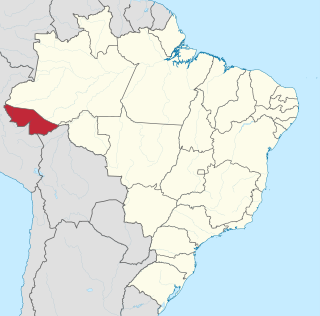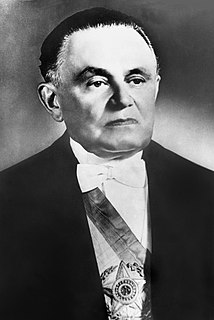
Acre is a state located in the northern region of Brazil. Located in the westernmost part of the country with a two hours time difference from Brasília, Acre is bordered clockwise by Amazonas to the north and northeast, Rondônia to the east, the Bolivian department of Pando to the southeast, and the Peruvian regions of Madre de Dios, Ucayali and Loreto to the south and west. It occupies an area of 152,581.4 km2, being slightly smaller than Tunisia.

Celso Monteiro Furtado was an important Brazilian economist and one of the most distinguished intellectuals of his country during the 20th century. His work focuses on development and underdevelopment and on the persistence of poverty in peripheral countries throughout the world. He is viewed, along with Raúl Prebisch, as one of the main formulators of economic structuralism, an economics school that is largely identified with CEPAL, which achieved prominence in Latin America and other developing regions during the 1960s and 1970s and sought to stimulate economic development through governmental intervention, largely inspired on the views of John Maynard Keynes. As a politician, Furtado was appointed Minister of Planning and Minister of Culture.

Samuel Isaac Benchimol was a Brazilian economist, scientist and professor of Moroccan-Jewish descent. He was also one of the leading experts on the Amazon region. He was assigned to the Amazonian Academy of Literature, Professor Emeritus at the Federal University of Amazonas, researcher at the F.E.A., community leader president of the Commitê Israelita do Amazonas and entrepreneur founding member of the group Bemol and Fogás.

The agriculture of Brazil is historically one of the principal bases of Brazil's economy. While its initial focus was on sugarcane, Brazil eventually became the world's largest exporter of coffee, soybeans, beef, and crop-based ethanol.

Jader Fontenelle Barbalho is a Brazilian politician, businessman and landowner from the state of Pará. He is currently a member of the PMDB party and a Senator for Pará. He is the father of Hélder Barbalho, mayor of Ananindeua, Pará, and the former husband of Federal Deputy Elcione Barbalho.

The Amazon Rubber Boom was an important part of the economic and social history of Brazil and Amazonian regions of neighboring countries, being related to the extraction and commercialization of rubber. Centered in the Amazon Basin, the boom resulted in a large expansion of European colonization in the area, attracting immigrant workers, generating wealth, causing cultural and social transformations, and wreaking havoc upon indigenous societies. It encouraged the growth of cities such as Manaus, Porto Velho, and Belém, capitals within the respective Brazilian states of Amazonas, Rondônia and Pará; as well as the expansion of Iquitos in Peru. The rubber boom occurred largely between 1879 and 1912. There was heightened rubber production and associated activities from 1942 to 1945 during the Second World War.
Water resources management is a key element of Brazil's strategy to promote sustainable growth and a more equitable and inclusive society. Brazil's achievements over the past 70 years have been closely linked to the development of hydraulic infrastructure for hydroelectric power generation and just recently to the development of irrigation infrastructure, especially in the Northeast region.
The Superintendency for the Development of the Northeast, or Sudene for short, is a Brazilian governmental agency created in 1959, during the government of President Juscelino Kubitschek (1956-1961), to stimulate economic growth in the northeastern region of Brazil, one of the poorest of the country, that faces chronic droughts and has a semi-arid climate. Sudene was created by suggestion of economist Celso Furtado, one of the leading intellectuals of Brazil, who was the agency's first director.
The Free Economic Zone of Manaus is a free economic zone in the city of Manaus, the capital of the State of Amazonas, Northern Brazil. The initial idea, a free trade port in Manaus, came from Deputy Francisco Pereira da Silva and was subsequently formalized by Law No. 3.173 on June 6, 1957. The project was approved by the National Congress on October 23, 1951 under No. 1.310 and regulated by Decree No. 47.757 on February 2, 1960. It was then amended by rapporteur Maurcio Jopper, engineer, who by agreement with the original author, justified the creation of a free economic zone instead of a free trade port.
Even though progress has been made in conserving Brazil’s landscapes, the country still faces serious threats due to its historica land use. Amazonian forests substantially influence regional and global climates and deforesting this region is both a regional and global driver of climate change due to the high amounts of deforestation and habitat fragmentation that have occurred this region.

Greater Manaus is a large metropolitan area located in Amazonas state in Brazil. It consists of 13 municipalities, including the capital, Manaus.

Amanã Sustainable Development Reserve is a sustainable development reserve in the state of Amazonas, Brazil.

A national forest in Brazil is a type of sustainable use protected area. The primary purpose is sustainable exploitation of the forest, subject to various limits. These include a requirement to preserve at least 50% of the original forest, to preserve forest along watercourses and on steep slopes, and so on. More than 10% of the Amazon rainforest is protected by national forests or other types of conservation unit.

The Rio Roosevelt Ecological Station is an ecological station in the state of Mato Grosso, Brazil.

The Rio Negro Sustainable Development Reserve is a sustainable development reserve (RDS) in the state of Amazonas, Brazil.

Imazon is a non-profit organisation based in Belém, Pará, Brazil, that is dedicated to conserving the Amazon rainforest. It has published many reports on aspects of conserving the Amazon environment, has had a significant impact on environmental policy in Brazil, and has developed tools through which deforestation may be viewed online.

The Central Amazon Ecological Corridor is an ecological corridor in the state of Amazonas, Brazil, that connects a number of conservation units in the Amazon rainforest. The objective is to maintain genetic connectivity between the protected areas without penalizing the local people, where possible using participatory planning that involves all affected actors.


















